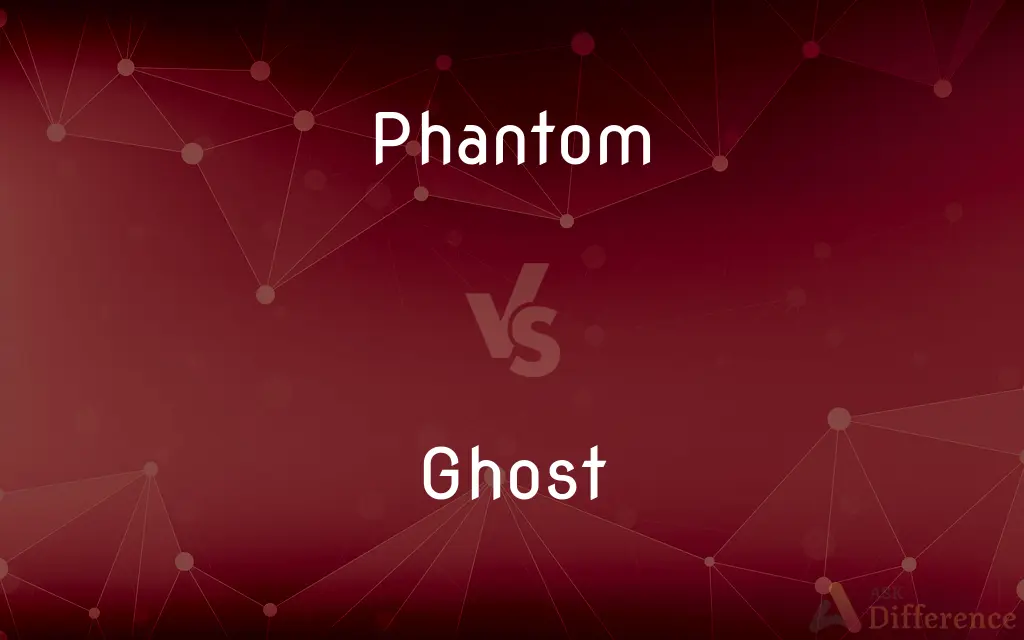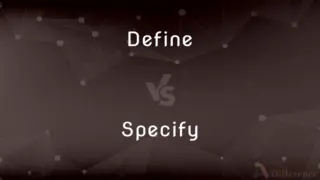Phantom vs. Ghost — What's the Difference?
By Maham Liaqat & Fiza Rafique — Updated on February 23, 2024
A phantom is a figment of the imagination or an elusive appearance, often without a specific backstory, while a ghost is traditionally considered the spirit of a deceased person, believed to appear to the living.

Difference Between Phantom and Ghost
Table of Contents
ADVERTISEMENT
Key Differences
The concept of a phantom encompasses a broad range of manifestations, including illusions, visions, or entities that may not have a clear origin or identity. Phantoms can be products of the imagination, often evoking a sense of mystery or fear without being tied to a specific story or place. They represent the unknown, appearing in literature and folklore as vague, shadowy figures that may or may not have malicious intent.
Ghosts, on the other hand, are generally tied to the spirits of the dead. They are often depicted as having a specific purpose or reason for appearing, such as unfinished business, seeking justice, or the desire to communicate with the living. Ghosts carry with them stories of their past lives, reasons for their demise, and connections to particular locations or people. This background provides a narrative framework that defines their actions and interactions with the world of the living.
Both phantoms and ghosts can instill fear or awe, while the nature of a ghost's appearance is usually more defined, with specific attributes related to its previous life or death. Phantoms, by contrast, might not have a discernible purpose or identity, acting more as symbols of fear or the supernatural rather than entities with a backstory.
The cultural significance of ghosts is deeply rooted in human history, appearing in the folklore and religious beliefs of many societies. They serve as a link between the living and the dead, often reflecting societal values, fears, and questions about the afterlife. Phantoms, while also prevalent in culture and storytelling, are more fluid in their representation, embodying the broader mysteries and fears of the unknown.
Understanding the nuanced differences between phantoms and ghosts enriches the appreciation of supernatural literature, folklore, and personal beliefs regarding the afterlife and the unseen. Both concepts stimulate the imagination and explore the boundaries between reality and the beyond, each with its unique place in the tapestry of human storytelling.
ADVERTISEMENT
Comparison Chart
Definition
An elusive, often imagined, entity without a clear backstory.
The spirit of a deceased person with a specific story.
Origin
Can be a figment of imagination or an undefined apparition.
Believed to originate from the souls of the dead.
Purpose
Often lacks a specific purpose or narrative.
Usually has a reason for appearing, such as unfinished business.
Cultural Significance
Symbolizes the unknown and mysterious aspects of the supernatural.
Represents the link between the living and the dead, reflecting societal beliefs about the afterlife.
Manifestation
Vague and shadowy, not necessarily tied to a location.
Defined by personal attributes and often tied to specific locations or people.
Compare with Definitions
Phantom
A mysterious apparition without a clear identity.
The old mansion was rumored to be haunted by a phantom that roamed its halls.
Ghost
The spirit of a deceased person believed to be visible to the living.
The ghost of the former lighthouse keeper is said to still watch over the coast.
Phantom
Can appear as a vision or hallucination.
Lost in the desert, he was tormented by phantoms of waterfalls and lakes.
Ghost
Associated with specific stories or legends.
Local legends speak of a ghost haunting the old bridge, waiting for her lost love.
Phantom
Represents a broad category of supernatural phenomena.
The forest was said to be full of phantoms, each more elusive than the last.
Ghost
Often seeks to communicate or fulfill a purpose.
The ghost appeared to reveal the hidden truth behind the ancient curse.
Phantom
Often used metaphorically to describe something elusive.
The concept of perfect security is a phantom chased by many but captured by none.
Ghost
Can evoke both fear and sympathy.
The tale of the grieving ghost moved all who heard it to tears.
Phantom
Symbolic of fear or the inexplicable.
The phantom of uncertainty hung over the village as the fog settled in.
Ghost
Integral to many cultural beliefs about the afterlife.
In many cultures, offerings are made to appease the ghosts of ancestors.
Phantom
An image that appears only in the mind; an illusion
Phantoms of a disturbed mind.
Ghost
In folklore, a ghost is the soul or spirit of a dead person or animal that can appear to the living. In ghostlore, descriptions of ghosts vary widely from an invisible presence to translucent or barely visible wispy shapes, to realistic, lifelike forms.
Phantom
Something apparently seen, heard, or sensed, but having no physical reality; a ghost or apparition.
Ghost
The spirit of a dead person, especially one that is believed to appear to the living in bodily form or to haunt specific locations.
Phantom
Believed to be real even though illusory
A phantom pregnancy.
Ghost
The spirit; the soul of man.
Then gives her grieved ghost thus to lament.
Phantom
Something apparently seen, heard, or sensed, but having no physical reality; an image that appears only in the mind; an illusion or delusion.
Ghost
Any faint shadowy semblance; an unsubstantial image; a phantom; a glimmering; as, not a ghost of a chance; the ghost of an idea.
Each separate dying ember wrought its ghost upon the floor.
Ghost
Haunt like a ghost; pursue;
Fear of illness haunts her
Common Curiosities
Is the concept of a phantom limited to human-like forms?
No, the concept of a phantom can extend to non-human-like forms, including animals, objects, or even abstract sensations.
Can a phantom interact with the physical world?
Phantoms are typically viewed as less likely to interact with the physical world, often being more illusory or symbolic.
Do phantoms have a physical form?
Phantoms may or may not present a discernible physical form, often appearing as vague or shadowy figures.
Do phantoms and ghosts appear in all cultures?
While the concepts may vary, most cultures have some form of belief or folklore involving spirits or supernatural entities akin to phantoms and ghosts.
Can ghosts be benevolent?
Yes, ghosts can be benevolent, with many stories depicting them as protective spirits or entities seeking to provide guidance or messages to the living.
Are all ghosts considered to be spirits of the deceased?
Traditionally, yes, ghosts are considered to be spirits of the deceased, although interpretations can vary across different cultures and beliefs.
Can a ghost be a phantom?
While a ghost can exhibit characteristics associated with phantoms, such as being elusive or mysterious, it typically has a more defined identity and backstory.
Are phantoms and ghosts always visible?
Not always; both phantoms and ghosts may manifest in ways other than visibility, such as through sounds, smells, or a general sense of presence.
Can technology detect phantoms or ghosts?
While there are claims of technology detecting ghosts or paranormal activity, such evidence is often disputed and not widely accepted by the scientific community.
How do cultural beliefs influence perceptions of phantoms and ghosts?
Cultural beliefs greatly influence how phantoms and ghosts are perceived, with each culture providing its own interpretations, narratives, and significance to these entities.
Share Your Discovery

Previous Comparison
Context vs. Content
Next Comparison
Define vs. SpecifyAuthor Spotlight
Written by
Maham LiaqatCo-written by
Fiza RafiqueFiza Rafique is a skilled content writer at AskDifference.com, where she meticulously refines and enhances written pieces. Drawing from her vast editorial expertise, Fiza ensures clarity, accuracy, and precision in every article. Passionate about language, she continually seeks to elevate the quality of content for readers worldwide.















































